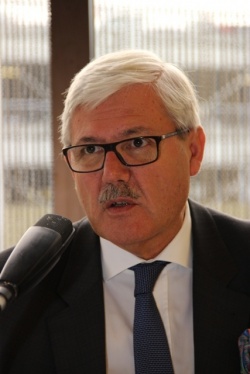MEDICA 2013
Sustainable financing is a sine qua non
MEDICA opens with key statements from “Deutscher Krankenhaustag”
In Germany, policymakers are currently negotiating the cornerstones of a coalition which will impact all stakeholders in healthcare in the upcoming four years.


At MEDICA, the “Deutscher Krankenhaustag” congress – driven by leading managerial bodies from the hospital sector – presented the major issues.
Half of the German general hospitals are in the red – this is the backdrop of the postulations made in Düsseldorf. And – no, this situation does not arise from a general shortcoming on the part of hospital management, said Dr. Josef Düllings, President, Verband der Krankenhausdirektoren Deutschlands (German Association of Hospital Directors VKD). Instead it is the effect of a policy framework which has been aiming at redistributing funds to the explicit disadvantage of providers. The DRG system, according to the opinion leader, is a major contributor to the issue. If these conditions prevail, underlined Dr. Düllings, the high level of hospital care people have been used to in Germany is definitely at stake … with effects that will make themselves felt beyond patient care: with 18 million inpatients, 20 million outpatients, a million staff and €80 bn revenue, German hospitals are a significant actor in the country’s economy.
Sustainable financing is the core challenge
It is clearly in the interest of the entire population for policymakers, payors, and care providers to find a consensus regarding a sustainable financing platform for hospitals, commented Alfred Dänzer, Congress President, “Deutscher Krankenhaustag” and President, Deutsche Krankenhausgesellschaft (German Hospital Association, DKG). The payor position of continuously pushing for savings on the part of providers is certainly not in the interest of the insured population. Various financing methods may be viable, said Dänzer, but if access to care is to be guaranteed in accordance with German laws, things desperately need to change – in the new legislative period. This includes financing of both investments and operations.
In addition to financing, measures alleviating the shortage of physicians have been on the political agenda – without any realistic effects on coalition agreements; improving access to care across sectors is a third challenge, said Prof. Dr. Hans-Fred Weiser, President, Verband der leitenden Krankenhausärzte Deutschlands (Association of the leading physicians in German Hospitals VLK). The German § 116b, a law enacted to facilitate cross-sector care for severe diseases, is a case in point: it turned to be a failure because players involved were in a competitive situation … payors, said Dänzer, were disinclined to support costly approaches to care leading to better outcomes, and neither did the GPs who compete with the hospitals for patients. This paragraph was eliminated, benefiting a newly introduced, third category of specialized physicians in addition to inpatient and outpatient care … a step reducing transparency further, according to Dänzer.
Looking at Europe
How does the situation in Germany compare with the rest of Europe? Whereas in many other countries, care is driven centrally, in this country a market approach has been the order of the day. Such a system makes public health goals hard to reach, said Dänzer: “We should discuss the re-introduction of a healthcare system based on a centralized budget, with DRGs serving as one of a set of tools to define those budgets”. The Congress President cited the French Assemblée Nationale which defines public health goals realized by policymakers. This approach allows for the sustainability which is much needed in Germany, where any goals envisioned at top political level lack channels for implementation, according to Dänzer who cited the § 116b as a prime example.
Call for immediate action
What is Dänzer’s message to politicians? They ought to implement what’s documented in the coalition agreement papers: put the patient, the insured population first – and let him/her select the suitable partner to provide medical services. In lieu of working towards tangible results to these issues, however, during the coalition talks the quality discussion has popped up again, said Prof. Weiser: It is a virtual discussion, however: while no care providers will seriously contend its viability, a results-driven approach is needed to make realistic progress. Prof. Weiser: “As a prerequisite, a set of empirical criteria is required”.
Reported by Michael Reiter
20.11.2013





